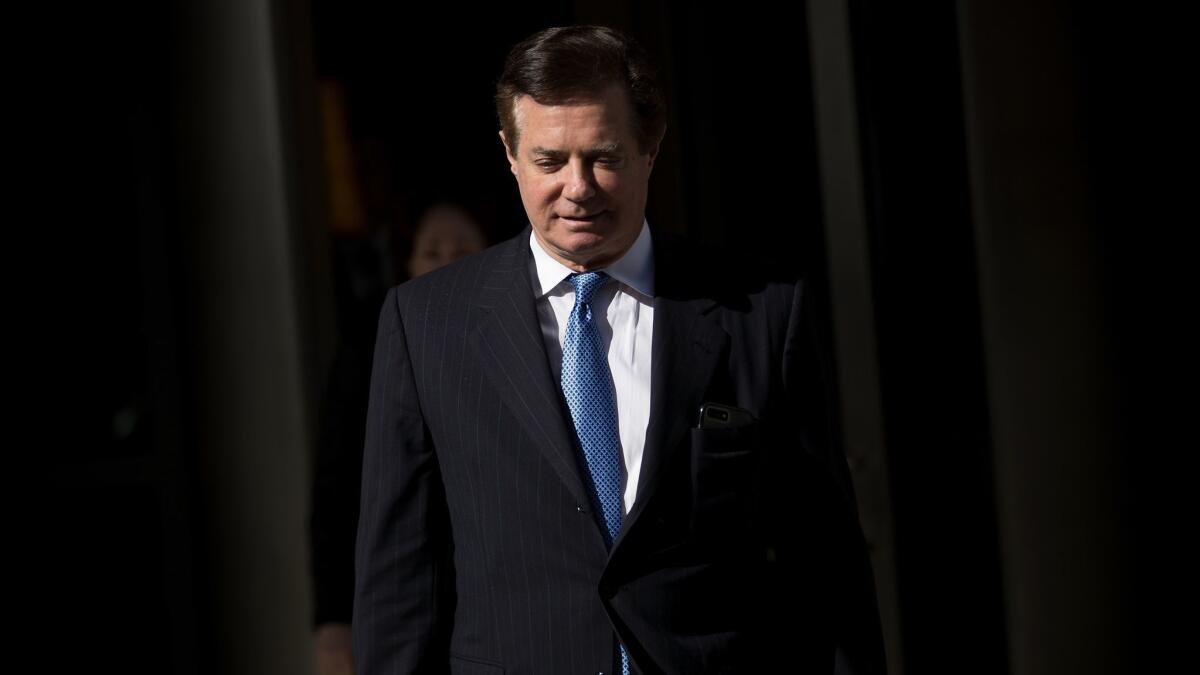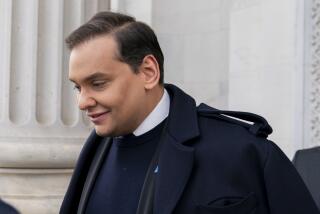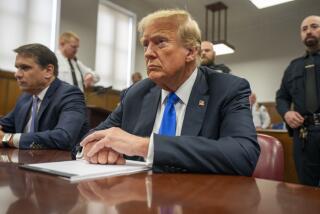Paul Manafort faces closed hearing Feb. 4 on Robert Mueller allegations he lied after pleading guilty

- Share via
Reporting from Washington — A federal judge asked for a hearing behind closed doors Friday before she decides whether Paul Manafort lied repeatedly to prosecutors in special counsel Robert S. Mueller III’s probe of Russian interference in the 2016 U.S. election, setting a hearing for Feb. 4, just days before President Trump’s former campaign chairman faces sentencing in Virginia.
If U.S. District Judge Amy Berman Jackson decides he lied and broke his plea agreement, it could add up to 10 years in prison for Manafort when his sentence finally is imposed. Manafort already faces a likely seven- to 10-year sentence in his related Virginia federal case, according to several legal experts.
The Friday hearing left for another day the merits of the government’s allegation Manafort “intentionally provided false information” to investigators since pleading guilty in federal court in September.
But prosecutors also made clear that they will not rule out bringing new charges against Manafort in the future, although they have no plans to do so right now.
“I’m not in any way saying it’s our current intention, it’s a plan, it will happen, but want to preserve that ability,” prosecutor Andrew Weissmann said.
Manafort could “hypothetically” be charged with lying to the FBI, with perjury in front of the grand jury, or with any of the charges prosecutors dropped in exchange for his plea and cooperation, Weissmann said.
Under the terms of Manafort’s plea deal, prosecutors have only to show that they determined he breached the deal in “good faith” for the agreement to be nullified.
Manafort, 69, who entered court in a suit and tie rather than prison togs and was leaning heavily on a cane, did not visibly react to Jackson during the hearing, which the judge called to “nail down” what the “consequences are or will be of the special counsel’s determination” that Manafort violated his plea deal.
Jackson told a courtroom packed with reporters that she knew the decision to seal the February hearing would be unpopular, but said prosecutors needed to discuss sensitive matters regarding ongoing investigations and uncharged individuals and that she did not see how the parties could address those topics in open court without making mistakes.
Jackson said the court would “get as much of the transcript released as possible, as soon as possible.”
“I have not made any decisions yet,” Jackson said, saying she found merit and flaws in both sides’ arguments.
Some of prosecutors’ allegations are “confusing or lack context,” she said, while at times the defense rebuttals were “conclusory and short on specifics.”
She said Manafort’s arguments that criminal defendants often misstate the facts in debriefings and correct them later “have some force.” But, Jackson added, there are other instances where Manafort “may have lied, pure and simple.”
Manafort pleaded guilty Sept. 14, on the eve of jury selection in Washington, to conspiring to defraud the United States and conspiring to obstruct justice, admitting to years of financial crimes related to his undisclosed lobbying work for a pro-Russian political party and politician in Ukraine, Viktor Yanukovych.
He was previously convicted by a jury in August in a separate federal case in Virginia for bank and tax-fraud crimes.
The collapse of Manafort’s cooperation deal revealed that prosecutors knew far more about his activities since his October 2017 indictment than he realized.
Since late November, when Mueller’s office accused Manafort of lying, the special counsel’s office has filed 800 pages of heavily redacted exhibits to provide evidence for their claims that, among other things, Manafort gave contradictory statements last August in a separate Justice Department criminal investigation outside of Washington; falsely denied having ongoing contact with Trump administration officials since they took office in January 2017; and sought to deceive investigators about his interactions with a longtime Russian aide and co-defendant, Konstantin Kilimnik, including by sharing campaign polling data with him in 2016.
The FBI has assessed that Kilimnik, a Russian employee of Manafort’s consulting business, has links to Russian intelligence, prosecutors said in court papers.
Manafort’s attorneys deny he lied, saying he made honest errors and tried to correct them. “Failure of memory is not akin to a false statement,” attorneys Kevin Downing, Thomas Zehnle and Richard Westling wrote in filings to the court.
Hsu and Weiner write for the Washington Post.
More to Read
Get the L.A. Times Politics newsletter
Deeply reported insights into legislation, politics and policy from Sacramento, Washington and beyond. In your inbox twice per week.
You may occasionally receive promotional content from the Los Angeles Times.










